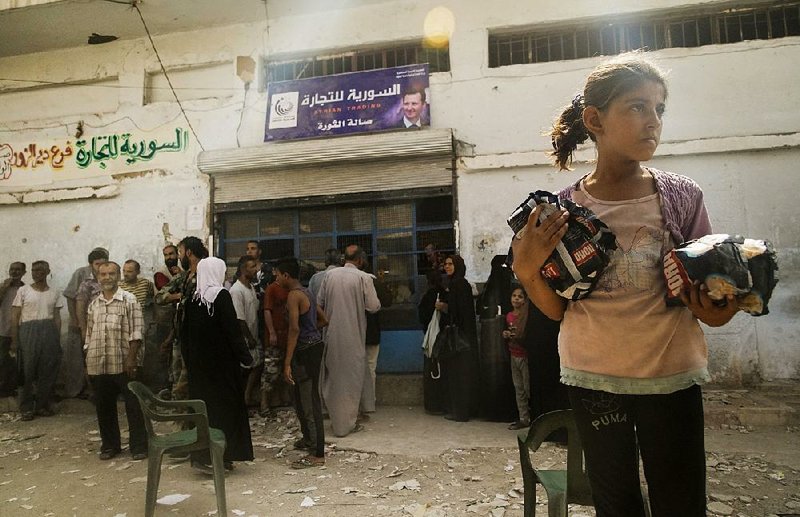DEIR EL-ZOUR, Syria -- Deir el-Zour is rising from the ashes, even as rounds of machine-gun fire can still be heard on the outskirts of town as Syrian government troops push out the remaining Islamic State fighters. Government forces now control about two-thirds of the city, while parts of the center and east are still dominated by extremists.
Government forces broke the Islamic State group's lengthy siege on Syria's largest eastern city earlier this month in a major offensive. Now, tens of thousands of residents can go out and buy food and other items.
On a scorching afternoon in Deir el-Zour, two dozen people patiently lined up at Rashid Izghair's small shop, which only opened a few days earlier, to get basic supplies: milk, pasta and canned food. They had been deprived of such items for nearly three years.
Dozens of trucks carrying food, medicine and fuel have been arriving in the city, though much more is still needed.
[THE ISLAMIC STATE: Timeline of group’s rise, fall; details on campaign to fight it]
"During those years our families who lived under the siege did not eat fruit or vegetables," said Mohammed Ibrahim Samra, Deir el-Zour's mayor. "[Islamic State] terrorists blocked all the roads leading into the city and cut off all infrastructure. We had no electricity, no gas or fuel all this time."
Late on Friday, fighting was ongoing outside the city as Syrian troops captured new areas along the west bank of the river including the town of Ayash.
Forces loyal to President Bashar Assad have been capturing areas around the country under the cover of Russian airstrikes since Moscow joined the war in September 2015. Breaking the siege of Deir el-Zour was Assad's biggest victory since December, when his forces captured eastern neighborhoods of the northern city of Aleppo, Syria's largest and once its commercial center.
The aim of the government appears to be to reach the border with Iraq to the east -- which would boost Iran's influence in the region -- as Iraqi forces gain ground on the other side of the border against the extremists.
Russia and Iran have been Assad's main backers since the conflict began in March 2011 with anti-government protests and later morphed into an all-out war. It is still not clear whether Syrian troops will be able to achieve their goal of reaching the Iraqi border on the northern part of Deir el-Zour as U.S.-backed fighters are marching on the eastern side of the Euphrates River under the cover of airstrikes by the U.S.-led coalition.
Deir el-Zour province is the last main stronghold of the Islamic State group, which controls towns and villages along the Euphrates all the way to the Iraqi border town of Qaim.
Dismantling the siege at Deir el-Zour on Sept. 5 brought relief to tens of thousands of civilians trapped in four government-controlled neighborhoods and a nearby air base that had been surrounded by the extremists from all sides since January 2015. The Syrian government estimates about 70,000 people have survived on erratic air drops of food and supplies during the siege.
The siege turned even basic food or goods into a luxury. Residents had to subsist on air drops delivered by international organizations and the Syrian government. The hospital's chief doctor, Khalil Alsan, said fuel shortages were so severe the ambulance service had to be shut down.
But now, the city and its residents -- traumatized by the lengthy siege -- are slowly coming back to life.
A market sprang up in the city center where locals sell second-hand goods or the scarce produce they grew in their yards off picnic tables or in makeshift tents made from metal rods and tarpaulin. On a recent day, shoppers stopped by to drink lemonade and eat falafel; elderly men play cards on the street.
A few blocks away, two dozen people lined up at Izghair's tiny grocery store. He said practically all of the city's shops were closed during the siege because owners simply had no supplies to sell.
Izghair's two female employees dispensed the shop's scarce selection of goods -- milk, pasta, canned food and detergent -- to customers who anxiously peeked into a small glass window of the store.
A man standing outside the shop, waiting for his turn to buy, took note of even these modest offerings.
"We had nothing before. Now there is aid that is distributed for free and there is also stuff in shops," he said.
A Section on 09/17/2017
